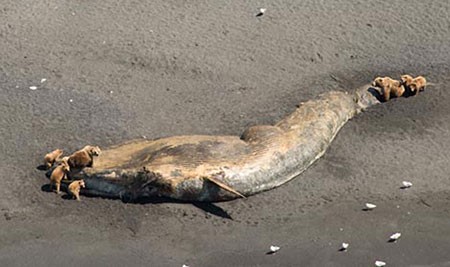The federal government released an announcement on Thursday, August 20, that they have already began to investigate about the mysterious deaths of whales in Alaska that was first observed since May this year.
The dead bodies have been washing up along the gulf shores of Western Alaska that includes Afognak Island, the Chirikof Island, Kodiak Island and the Semidi Islands, including southern areas of the peninsula. In total, 14 humpback whales, 11 fin whales and four other unidentified whales and a lone grey whale were discovered dead ashore in the last four months.
This event is so uncanny that the National Oceanic and Atmospheric Administration already declared that this occurrence is an Unusual Mortality Event which is defined by the Marine Mammal Protection Act as animals that are stranded in an unexpected manner with a significant die-off of any marine mammal population that demands immediate response and action.
According to Teri Rowles, who is the coordinator of the Fisheries's Marine Mammal Health and Stranding Response program, the exact cause of the whales' deaths has not yet been determined but investigations are now being carried out in order to obtain crucial data about the overall state of health of the whales and the conditions of the ecosystems and environment they belong to.
Rowles adds that so far, only one sample has been taken from one dead whale where the findings from the specimen revealed that the whale is negative for domoic acid which is a toxin that is produced by algae, but since the samples are already beyond decay, the results may not be as conclusive.
In addition, the reports also reveal that most of the carcasses were floating on the waters and still remain irretrievable. Majority of the dead whales that are uncovered were deemed to be in moderate to severe decomposition states.
According to marine mammal specialist and lead investigator, Bree Witteveen of the Alaska Sea Grant program, obtaining samples from the dead whales is a very challenging task since Alaska possesses a massive, uninhabited and jagged coastline that makes access rather limited where she says that it has been unfortunate to not being able to reach those bodies more often than not.



























